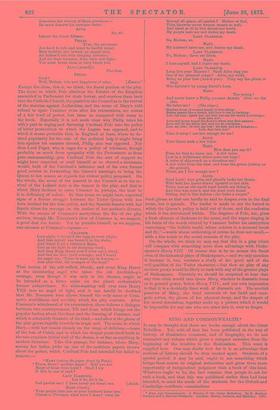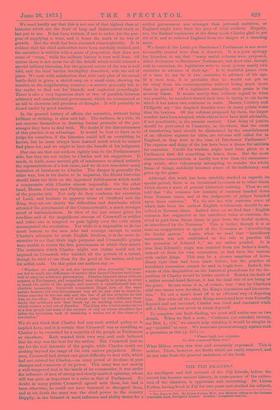KING AND COMMONWEALTH.!
IT may be thought that there are books enough about the Great Rebellion. Yet, with all that has been published in the way of history, of illustrative comment, and of biography, we do not remember any volume which gives a compact narrative from the beginning of the troubles to the Restoration. This want is supplied here. One may doubt bow far it is an advantage that sections of history should be thus treated apart. Students of a special period, it may be said, ought to use something which brings them nearer to original authorities and gives them more opportunity of independent judgment than a book of this kind. Whatever ought to be, the fact remains that people do ask for such a book, and that this was published earlier than had been intended, to meet the needs of the students for the Oxford and Cambridge certificate examinations.
* sing and Commonwealth. A History of the Great Rebellion. By B. Meriton Cordery and J. Sartees Phillpotts. London : Seeley, Jackson, and Halliday. 1875.
We need hardly say that this is not one of that highest class of histories which are the fruit of long and disinterested study at last put to use. It has been written, if not to order, for the pur- pose of supplying a want, and it bears the mark of its way of growth. But the work has been executed conscientiously. It is evident that the chief authorities have been carefully studied, and the narrative is written with a sense of proportion that does not come of "cram," while the military history is very well done. Of course there is not room for all the details which would interest a special military historian, but the general course of the war is well told, and the chief battles intelligibly described, with the aid of plans. We note with satisfaction that with each plan of the actual battle-field is given a sketch-map on a small scale, showing its relation to the neighbouring country,—a matter generally left to the reader to find out for himself, and neglected accordingly. There is also a very ingenious chart or tree of parallels between arbitrary and constitutional government, which we recommend as an aid to clearness and precision of thought. It will probably be found useful by good teachers.
In the general history of affairs, the narrative, without being brilliant or striking, is clear and fair. The authors, as a rule, do not exercise themselves in drawing formal portraits of the per- sonages they have to deal with. We doubt if the discontinuance of this practice is an advantage. It would be best to leave us to judge for ourselves, if the historian could tell us everything he knows, but he must always have learned much which he cannot find place for, and we ought to have the benefit of his judgment.
One can see that our authors rightly lean to the Parliamentary side, but they are not unjust to Charles and his supporters. It needs, in truth, some natural gift of intolerance to attack unfairly the representatives of a lost cause, and we do not remember many instances of harshness to Charles. The danger is generally the other way, lest in his desire to be impartial, the liberal historian should insist too little on the ingrained faithlessness which made a compromise with Charles almost impossible. On the other hand, Messrs. Cordery and Phillpotts do not slur over the faults of the popular side. Not only do they condemn the execution of Laud, and hesitate to approve those of Strafford and the King, they set out clearly the difficulties and drawbacks which attended the government of the Commonwealth, a much stronger proof of fairmindedness. In view of the just causes given for rebellion and of the magnificent success of Cromwell as soldier and ruler, one is tempted to pass lightly over the evils which accompanied the revolution. Yet while it is impossible to do too much honour to the men who had courage enough to resist Charles's attempts to crush English freedom, it is the more in- structive to see that their high• purposes and Cromwell's genius were unable to secure the free government at which they aimed. The restraints which Charles might not violate could not be imposed on Cromwell, who wielded all the powers of a tyrant, though he tried to use them for the good of the nation, and not for selfish ends. On this point our authors say : -
"Whether we admit, or not, the 'tyrant's plea, necessity,' we must not fail to mark the difference of motive that caused Charles and Crom- well to exercise arbitrary government. Charles imposed taxes without consent of Parliament, and committed men illegally to prison, in order to break the spirit of the people, and convert a constitutional into an absolute monarchy. Cromwell committed illegal acts of the same nature because his own Government was all he saw able to stand be- tween anarchy on the one side and the loss of all the victories he had won on the other. History will always judge by very different stan- dards the arbitrary acts that break up an existing order, and those which restore order out of disorder. The king who tries to make slaves of a free people has none of the excuses of one on whose shoulders has fallen the herculean task of remaking a nation out of the chaos of a
revolution."
We do not think that Charles had any such settled policy as is implied here, and it is certain that Cromwell was as unwilling as Charles to be overruled by a majority of the people in Parliament or elsewhere. Both wanted their own way, and each believed that his way was the best for the nation. But Cromwell had an eye for the real interests of the people, while Charles could see nothing beyond the range of his own narrow prejudices. More- over, Cromwell had always one great difficulty to deal with, which had not existed for Charles,—an army proud of its share in past changes and conscious of its power. This army was not merely a well-tempered tool in the hands of its commander, it was under the influence of men of strong and clearly-marked opinions, whose will was quite as important to a ruler as, that of Parliament. No doubt in many points Cromwell agreed with them, but had it been otherwise, he could not have ventured to disregard them, and at his death the army was the chief power in the country Happily, in the General of most influence and ability desire for a
settled government was stronger than personal ambition, or England might have been the prey of rival soldiers. Happily, too, the Radical tendencies of the Army made Charles glad to get rid of it, and so relieved England from the danger of a standing army.
We doubt if the Little (or Barebones') Parliament is not more favourably treated here than it deserves. It is a poor apology for blunders to say that " many useful reforms were proposed, which do honour to Barebones' Parliament, and show that, though rash in execution, its legislators were in most points nearly two centuries in advance of their age." It is doubtful praise even of a man to say he is two centuries in advance of his age. If it were true, it is probable that he would not get so far away from his contemporaries without losing much more than he gained. Of a legislative assembly, such praise is the severest blame. It means merely that, without regard to what was possible, its members wasted their time in trying to cut knots which it has taken two centuries to untie. Messrs. Cordery and Phillpotts say "the despised fanatics were in many points wiser than the lawyers. Of the reforms proposed by them, the larger number have been adopted, while others have been held advisable, if not practicable, in the present century. That delay of justice should be prevented in Chancery, as elsewhere, that the costs of transferring land should be diminished by the establishment of an effective registry for titles, are reforms still called for in England, as they were in the time of Barebones' Parliament." The expense and delay of the law have been a theme for satirists for centuries. Credit for wisdom might have been given to s Parliament that did something to lessen them. But the most obstructive conservatism is hardly less wise than the statesman- ship which, after vehemently attempting to remake the whole frame of things, suddenly becomes aware of its inefficiency, and gives up the game.
Although this work has been carefully studied as regards its special period, there is an occasional looseness as to other times which shows a want of general historical training. Thui we are told that " the common law consists of customs handed down from Norman times, and of the judgments of judges founded upon these customs." We do not see why customs, some of which date from the earliest English settlements, should be as- cribed to Norman times. Indeed later on we find that "English common law originated in the unwritten rules or customs, de- rived in part from Saxon times, in part from the feudal system, as introduced by the Normans." This is better, though it is at least an exaggeration to speak of the Normans as "introducing the feudal system." Again, when we read that " hereditary succession was not established as the rule in practice till the accession of Edward I.," we are rather puzzled. It is true that Edward's reign was counted from his father's death, instead of from his own coronation, as had been the custom with earlier kings. This may be a clearer assertion of here- ditary right than had been made before, but the practice of hereditary succession cannot be said to begin here. Indeed, the whole of this disquisition on the historical precedents for the de- position of Charles would be better omitted. Besides the fault of a rather second-hand flavour, it has the fatal vice of not being to the point. In one sense it is, of course, true "that by Charles's trial two issues were decided, the King's deposition and his execu- tion." To cut a man's head off is an effectual way of deposing him. But while all the other Kings mentioned here were formally deposed and not executed, Charles was tried and executed while still a King, and was never in terms deposed.
To complete our fault-finding, we must still notice one or two details. When we find a note, " Cadmean (or suicidal) victory, see Hdt. I., 116," we cannot help thinking it would be simpler to. say "suicidal" at once. We must also protest strongly against such a quotation as this (p. 347) :—
" Peace bath her victories No less renowned than war."
What Milton wrote was true and accurately expressed. This is neither. These, however, are faults which are easily removed, and do not take from the general usefulness of the book.



































 Previous page
Previous page